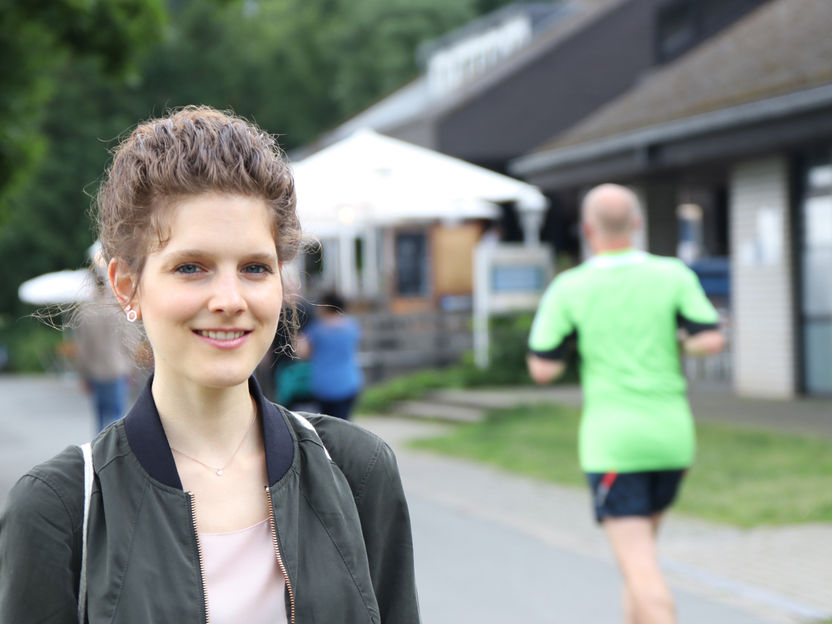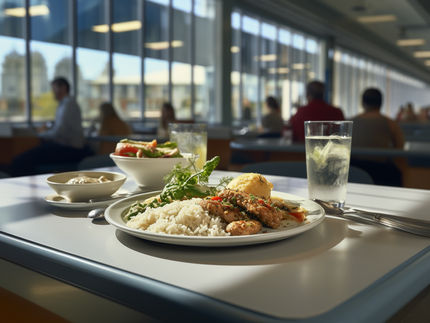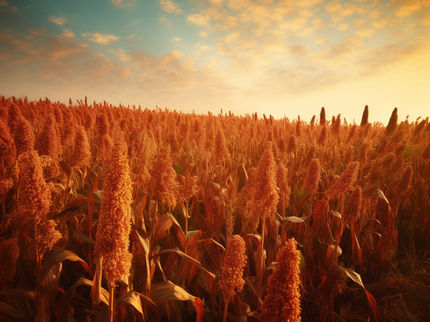Not enough zinc?
Thousands of amateur athletes are looking forward to the coming marathon season. How powerful they are depends on their general condition and training - but also on whether the body is supplied with vital nutrients. One of them is zinc. Without the trace element, many metabolic processes could not take place. It is also thought to have an important function in the immune system. Zinc deficiency is not clearly discernible to those affected because of the many functions of the mineral, but frequent colds, for example, could be a sign.

Christina Brachthäuser herself liked to walk at the Aasee in Münster during her studies of Oecotrophology. In her bachelor thesis she dealt with nutrition and sport, for which she received the University Award 2019 of the FH Münster.
FH Münster
"Studies show that performance-oriented athletes have an increased need for zinc," says Christina Brachthäuser, an oecotrophology graduate from Münster University of Applied Sciences. "If they're also vegetarians, they should make sure they get enough zinc."
Endurance athletes with intensive training lose zinc mainly through sweat, urine and competition stress. Vegetarians lack meat as a top supplier in their diet. In addition, zinc from plant foods is more difficult to utilise than zinc from animal foods. Ingredients such as phytate and fibre are responsible for the poorer recovery because they form complexes that are difficult to dissolve with zinc.
Does zinc count thus with vegetarian living Breitensportlern among the critical micro nutrients? Christina Brachthäuser examined this in her thesis and received this year's university award for the best bachelor thesis in the field of Oecotrophology - Facility Management. Prof. Dr. Anja Markant and Melanie Schumacher were in charge of them.
"In addition to scientific curiosity, I was also guided by personal interest," says the vegetarian and ambitious amateur sportswoman. In her final thesis she evaluated the study situation and developed vegetarian nutrition plans for a reference person to find out whether the recommended zinc requirement can be covered by a natural diet.
How much zinc the human being needs, over it is strongly discussed in the nourishing science. Recently, the German Nutrition Society (DGE) revised its reference values for zinc intake by giving recommendations based on phytate intake: The higher this is, the higher the recommended daily amount of zinc. According to the DGE it should be from 7 to 10 milligrams for women and from 11 to 16 milligrams for men.
On the basis of the studies available at the time of her research, Christina Brachthäuser derived a requirement of 15 milligrams of zinc per day for a vegetarian and performance-oriented amateur athlete. In her work, the ecotrophologist comes to the conclusion that this amount is feasible. "Provided the diet includes many zinc-rich foods, is permanently balanced and well planned." With a well-founded knowledge of nutrition, healthy ambitious amateur athletes could usually do without zinc supplements, according to one of their conclusions.
For example, a lot of zinc is found in oat flakes, whole grain cereals, natural rice, legumes, nuts and pumpkin seeds. Important zinc suppliers of animal origin are meat, dairy products and eggs. Some foods even promote zinc absorption. Christina Brachthäuser recommends the combination of whole grain cereal products with dairy products or the addition of citric acid. "You can simply add a fresh orange to the breakfast muesli, squeeze a fresh lemon into the salad dressing or yoghurt, cover wholemeal bread with cheese or garnish the wholemeal noodles with sliced hard cheese".
Before the upcoming sporting competitions, it is important, especially for vegetarians, to supply the body continuously with zinc and of course with other nutrients to support body functions and performance, according to the graduate, who now works as a nutritionist in a diabetological practice in Essen. The body cannot produce zinc itself and can only store it for a limited time.
Note: This article has been translated using a computer system without human intervention. LUMITOS offers these automatic translations to present a wider range of current news. Since this article has been translated with automatic translation, it is possible that it contains errors in vocabulary, syntax or grammar. The original article in German can be found here.





























































